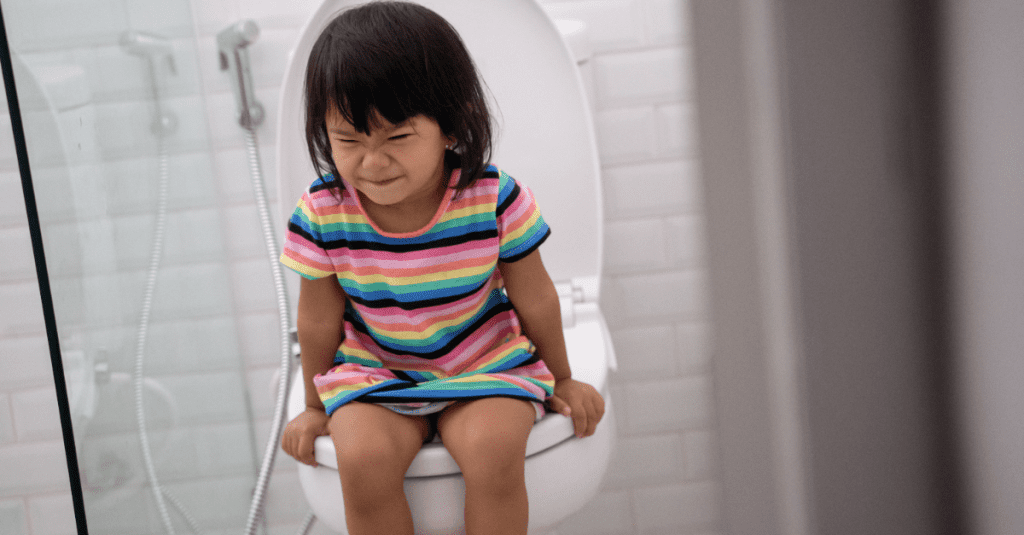Having your child sleep through the night for the first time is a momentous milestone. According to Stanford Medicine Children’s Health, “about two-thirds of babies are able to sleep through the night on a regular basis by age 6 months.”
However, it is not rare for your baby or toddler to have bowel movements overnight, early in the morning, or at naptime, disrupting your and their precious sleep. Enter the conundrum: what do I do if my child poops while they sleep?
Luckily, there are easy changes you can make to your daily routine to minimize your child pooping in their sleep.
Although it may take some investigative work on your part, remind yourself this is only a phase, and with a little help from you, your toddler will be sleeping through their nap or the night in no time!
What to Do About a Toddler Pooping in Their Sleep Every Night

1. Apply Diaper Ointment Before Bed
While some children ring the alarm the moment they poop or pee in their diaper, others stay fast asleep. This may be good news for you as both of you will get much-needed, uninterrupted sleep. However, leaving your child to sleep with a soiled diaper can have many repercussions.
According to a study published in the National Library of Medicine, diaper dermatitis, commonly known as diaper rash, “occurs in about 50% of infants, and it accounts for about 25% of visits to primary care physicians.”
Additionally, leaving your child with a soiled diaper can lead to yeast and urinary tract infections (UTIs), especially in children under two years of age.
To prevent the dreaded diaper rash, infections, or any discomfort in your toddler while they sleep, slather their bottom with diaper ointment to create a barrier between their skin and the soiled diaper. Be generous and apply a thick layer before bed. It is better to add too much than to find out it wasn’t enough in the morning.
2. Keep a Food and Bowel Movement Log

Keep track of your child’s food intake and bowel movements for several days. What they eat and when they eat may shed some light on their bowel movements, especially when trying new foods.
Take note of when they eat high-fiber foods, then change their meals accordingly. If it looks like eating high-fiber foods is contributing to their middle-of-the-night bowel movements, then try moving them to meals earlier in the day. Also, switch to more “binding” foods for dinners, such as toast, pasta, rice, cheese, and meat.
Also, constipation can affect your child’s bowel movements during sleep since the muscles in the digestive system relax during sleep, and digestion becomes easier when laying down.
If you suspect your child may be constipated, check for:
- less than three bowel movements per week
- hard stools and difficulty or pain going poop
- stomach pain
- bloody stool
Add fiber at the right times of the day based on your food log assessment, increase hydration, and encourage more movement and exercise in their daily routine.
Prolonged symptoms may require you to seek professional help.
3. Incorporate Potty Time into Their Bedtime Routine
For most children, poop and pee training happen separately, with poop training usually taking longer. Due to their uneasiness about the potty, toddlers will often hold it until they get the diaper for naptime or bedtime.
If this happens, make sure to include potty time in their bedtime routine and allow enough time for them to spend on the potty before going to bed. Help your child relax by reading a book, telling them a story, or adding relaxing essential oils, such as lavender or another relaxing combination, to a diffuser.
If you’ve given the potty a try and nothing happened, once the diaper goes on, give them a little time before putting them to bed. All some children require is a little privacy, whether on the potty or in their diaper. If you see your child going to a quiet corner or behind the curtains, allow them some safe alone time. Their crib could also be a safe place for them.
4. Recognize Attention Seeking Behavior
According to Johns Hopkins Medicine, most children obtain bowel and bladder control around 24 to 30 months. As toddlers begin to experience some independence, they try to exert their power through things they can control, such as eating, sleeping, and pooping.
As a result of this newfound independence, some toddlers may choose to poop during their naps or at bedtime. When this happens, don’t give in to their attention seeking.
If you must change their diaper in the middle of the night, keep it boring, don’t make a fuss, and don’t engage them. Keep the lights dim and your supplies handy to make it as fast as possible. Put them back to bed and leave. This may take some time, especially since they’re not getting what they want.
5. Keep a Consistent Bedtime Routine

Schedule dinner earlier to allow ample time for digestion before bed. It is a good idea to stop eating about 45 minutes before bedtime. Keep water intake to a minimum before bed as well.
Include a warm bath to help your child relax and allow some potty time afterward. Following an eat, bath (for bedtime), play, and sleep routine will help your baby relax and have plenty of time to poop before nap or bedtime.
Knowing what to expect will also help your little one relax, which will, in turn, help them poop before bed.
6. Review Your Toddler’s Sleep Schedule
Having a consistent sleep schedule helps regulate a person’s body systems. This is especially true for children. According to Stanford Medicine Children’s Health, most children between 1-2 years of age require about 11 hours of nighttime sleep and about 2-3 hours of daytime sleep.
If your child wakes up too early to poop, their bedtime may be too early. Chaotic or ever-changing naptimes and bedtimes will create unhealthy sleep habits in your child and will disrupt other areas of their lives, such as their bowel movements.
7. Switch to Disposable Diapers or Undies When They Sleep
If you use cloth diapers for your child, you may consider switching to disposable ones at night. Cloth diapers do not wick moisture away as effectively as disposable diapers do. The warm, moist environment a cloth diaper creates can lead to a rash and infections, even if you use diaper ointment. A missed poopy diaper can have painful consequences for your little one.
Foregoing diapers at bedtime can be another option. Your child may not like the new feeling of wearing undies and they may have a couple of accidents at first. But, for some, taking away the safety net of a diaper seems to help.
Final Thoughts
Helping your toddler have uninterrupted sleep can be a challenge. While naptime and bedtime bowel movements can be disruptive to your child’s sleep, looking at routines and habits in their daily life can have a positive impact on them.
As you navigate this new phase, being patient with your child and yourself can go a long way in creating a supportive and relaxing environment conducive to growth and understanding.

